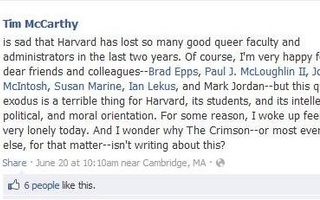Whether the incident at Lamont had absolutely anything to do whatsoever with hate or bias, the initial reporting of the event, as such, incited a particular dialogue on campus that is often overlooked in favor of other issues. The most ironic aspect of this matter for me personally was just that day, at lunch, I had been inarticulately trying to explain to my straight friend why I still find it difficult to straightforwardly define myself as gay, lesbian, or bisexual. “Those words have so many ugly connotations,” was the best I could come up with. She didn’t entirely understand.
“But we’ve come so far in 80 years!” she said.
It’s true, “we’ve” definitely come “far” in 80 years—80 years being an arbitrary number meant to soothe me. I completely agree that society as a whole has made almost inconceivable strides in advancing equality for all disempowered people since the early 1900s. But what makes it difficult for me to define myself as gay is that I can see the other side so clearly, having been there myself. When you’ve never really thought about gayness except as something that is absolutely not you, is it really that surprising that to some people it seems strange, and almost willful? I’ve been asked by people close to me if lesbianism is really just about a desire for a “really intimate and close friendship with another girl.” It’s a legitimate question, because isn’t love about intimacy and closeness? The only problem with the question is that it misses the point that gayness is real. It’s not a stance you assume because you’re lonely or bored.
So when a bottle from someone’s personal urine collection just somehow finds itself being poured on a row of books with LGBTQ themes, I feel degraded. At Harvard, we’re privileged to live in an environment that is comparatively open and accepting. But the reality is that acceptance is still only partial. It’s the same feeling I get when I hold my girlfriend’s hand in the street and I sense people’s double takes. It’s sad when a simple gesture of affection loses its innocence. Even I look twice when I see gay couples walking around, although usually my curiosity is out of a sense of solidarity.
It’s so easy to look away from things you don’t want to understand. Whatever did or did not happen at Lamont leaves us with two possible solutions. The path of least resistance is to look away in distaste. The other is to confront the difficult truth of intolerance. The Queer Students Association has recently been protesting the lack of funding and the lack of space at Harvard for LGBTQ students. While I applaud the energy and community building these protests engender, I personally am not looking for a space or the University’s resources to be “empowered” to be separate and unequal. I instead am looking for common human dignity.
Catherine A. Morris ’10, a Crimson arts writer, is a history and literature concentrator in Quincy House.
Read more in Opinion
Progress Through ProjectsRecommended Articles
-
Recently Hired Dean of LGBTQ Student Life Turns Down PositionLee Forest, who was hired by the College in September as the first director of bisexual, gay, lesbian, and transgender student life has decided to turn down the position at Harvard.
-
It Gets BetterHarvard’s community has produced its own contribution to the ongoing fight against discrimination and ostracism among young people.
-
Foundation Meets with LGBTQ GroupsLeaders from the undergraduate LGBTQ community met with researchers from the Berkman Center for Internet and Society and affiliates from the Born This Way Foundation Tuesday morning to provide their input on the foundation’s initiatives.
-
 "Queer Exodus" from Harvard Subject of Facebook Discussion
"Queer Exodus" from Harvard Subject of Facebook Discussion -
Harvard Establishes First LGBTQ Faculty Position in the United StatesHenry D. Abelove ’66, who retired as an English professor from Wesleyan University in 2011, will serve as the first F.O. Matthiessen Visiting Professor of Gender and Sexuality, a one-semester position that is responsible for teaching classes on LGBTQ issues. The chaired professorship is the result of a $1.5 million endowment that was raised by efforts of the Harvard Gay and Lesbian Caucus.
-
Ferguson Comments and Apology Draw Mixed ReactionsIn the face of international criticism, Harvard History professor Niall Ferguson apologized for his comments about John Maynard Keynes’ sexual orientation and its relation to his economic theories, prompting mixed reactions from the Harvard community.













